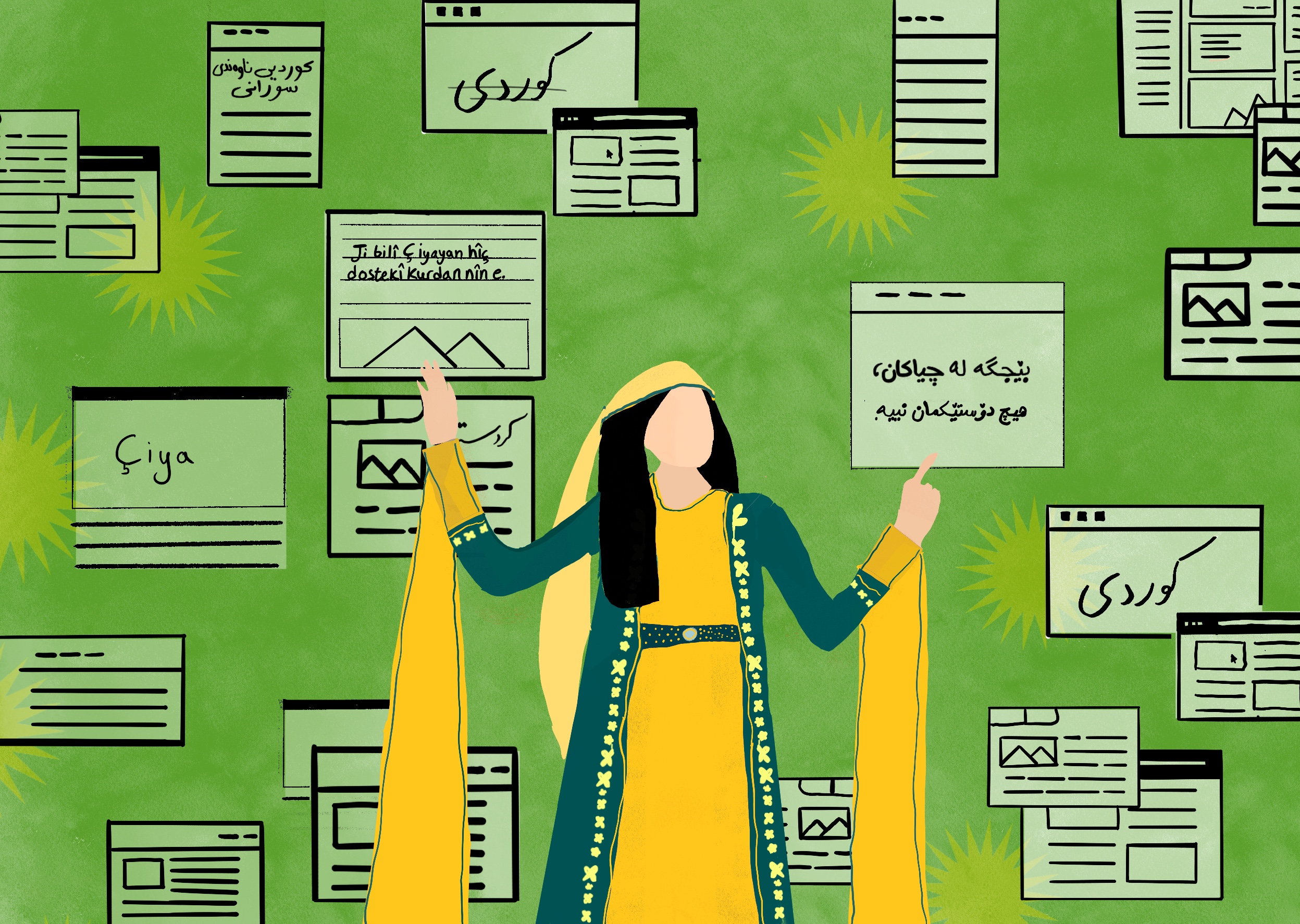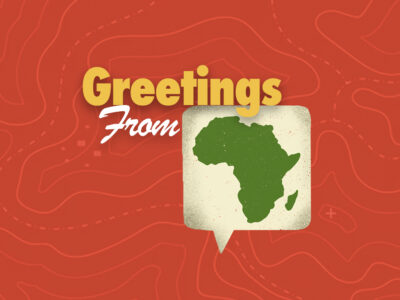
Art by Noran Morsi developed for Global Voices.
Nestled within the Kurdistan mountains near the Iranian border, the Iraqi town of Halabja is best known for the tragic use of chemical weapons against its people by the Saddam Hussein Army.
Years later, the town gained recognition within the Kurdish digital sphere, courtesy of a young visionary called Bokan Jaff, a resident of Halabja. Jaff earned an English degree from the University of Sulaymaniyah in 2014 and assumed the role of translating information for his community. This was particularly vital as they faced difficulties accessing essential online information in Kurdish, including world news, safety, healthcare, and more. Jaff’s assistance was especially appreciated by Kurdish university students struggling to find online information in their native tongue.
As Jaff became more aware of the shortage of Kurdish resources online and the difficulty posed by limited English and Arabic proficiency among Kurdish speakers, he came to realize the urgent need for improved information accessibility in the Kurdish language.
Motivated by a strong determination, he embarked on an eight-year-long journey as a volunteer at Google. His goal was to integrate Sorani, commonly known as Kurdî Nawendî (کوردیی ناوەندی), a prominent language within the Kurdish language family, into the languages supported by the Google translation app.
Jaff has successfully translated more than 2,500,000 phrases, proverbs, and individual words. As a result, the Sorani language was officially added to Google Translate in May 2022, giving rise to a community of Sorani translators in the process. In an interview with Global Voices, Jaff said, “The lack of content in Kurdish has made it difficult for us to find the information we need and has hindered the development of the Kurdish language in the digital world.”
The complex landscape of Kurdish languages online
Kurdish is a language or a group of languages spoken by the Kurds, an Indigenous ethnic community of around 30 million people. Native to the Middle East and West Asia regions, they share culture, linguistic heritage, and identity, yet are spread across four nations: Turkey, Iraq, Syria, and Iran.
Kurdish languages comprise distinct but interconnected linguistic variations that lack mutual intelligibility. The main two languages are Northern Kurdish (Kurmanji), spoken in Turkey, Iran, the Caucasus, and Khorasan regions, and Central Kurdish (Sorani) which is prevalent in Iraq and Syria. Sorani, alongside Arabic, holds official status in Iraq and is commonly referred to as “Kurdish” in official documents. Each of these languages is spoken by millions of people.
These languages employ different scripts for writing: Kurmaji uses the Latin (Roman) script, while Sorani uses the Aramaic (Arabic) script.
Although the Kurdish languages possess a rich history, celebrated for their expansive vocabulary and expressive abilities, they face a shortage of online resources. The different writing scripts, along with the absence of standardization and ongoing power struggles among Kurdish communities, contribute to the challenges.
Furthermore, these challenges are compounded by restrictions imposed by oppressive governments, censorship, and limitations on freedom of expression in all the countries where Kurds reside.
The scarcity of online resources has compelled Kurdish speakers to rely on other languages such as Arabic, English, Turkish, and Persian. In a conversation with Professor Dara Hameed, a Kurdish language PhD holder teaching at the University of Garmian, he explained to Global Voices how this shortage of online information and technical resources negatively affects Kurdish academics in Iraq.
We face these challenges daily, particularly with our university students. For instance, in the Kurdish department, and I believe this is a common issue across various college departments, there is a significant scarcity of Kurdish resources available online. My students encounter challenges when trying to access information in Kurdish.
They are compelled to use sources in other languages through electronic translation, which is not without its problems. Alternatively, they are left with no option but to turn to expensive translators. As a result, these students are unable to fully harness the advantage of technology.
Hameed further elaborated that this issue is confined to the online realm. He added:
The problem lies in the online sphere, not offline. The Kurdish language is linguistically diverse. Imagine having six words for “خۆشەویستی” (love) alone.
Our focus should be on addressing standardization issues, dialectic divisions, and political pressures, as these factors make it difficult for the Kurdish language to thrive online.
Iraqi Kurds’ political fight for recognition and language rights
For centuries, the Kurds have fought for both independence and recognition within the countries they reside, constituting the world’s largest stateless ethnic community. This struggle traces back to colonial treaties like the Treaty of Lausanne 24 July 1923, which partitioned the Kurds among four countries.
Compared to neighboring countries, Kurds in Iraq experience a relatively favorable situation. For example, Iraq is the only country where Kurdish is recognized as an official language, and it is also the only place where Kurds enjoy considerable autonomy.
Research by Lauren Walter at Depaul University in 2018 revealed that during the British Mandate, Sorani was favored by urban Kurdish nationalists, while Kormanji held a stronger literary role, giving Sorani greater political influence. Nevertheless, there was an interest in creating divisions among speakers of these languages. “Both dialects lived in relative harmony until Iraq gained independence in 1931. After gaining independence, the Iraqi government attempted to pit Sorani and Kormanji speakers against one another in order to keep Kurdish from being recognized as an official language.”
A pivotal milestone for the Kurdish language in Iraq unfolded with the autonomy agreement known as the Iraqi–Kurdish Autonomy Agreement of 1970 signed on March 11, 1970 by the Iraqi government and Kurdish leader Mullah Mustafa Barzani. Following decades of armed conflicts and tensions between the Iraqi government and the Kurdish communities in Iraq, this agreement recognized Sorani as an official language in areas with a Kurdish majority. It also ensured the Kurds political representation in government entities.
However, the path to freedom of expression for Kurds in Iraq has been complex and subject to fluctuation over time. After the agreement, repression under Saddam Hussein’s regime was intense, with subsequent periods attempting to acknowledge the rights of Kurdish communities in Iraq.
Challenges with language standardization and access to information
Research indicates that in countries with dominant languages, speakers of minority languages often face marginalization and restricted access to information. In Kurdistan Iraq, internal conflicts among Kurdish languages, particularly Sorani and Kurmanji, not only intensify marginalization and division but also hinder the online representation, development and dissemination of the language.
As of today, Kurdish lacks a universally accepted writing standard, with political parties in the Kurdistan region entangled in disputes over standardization. Despite various attempts, a standardized version remains elusive.
This absence of linguistic unity and standardization creates obstacles for those seeking online information and resources in their native language. Additionally, it hinders effective information sharing, limiting the Kurds’ ability to contribute to the digital world.
This scenario suggests that if a Kurmanji Kurd wishes to communicate with a Sorani Kurd, they might resort to using Arabic, Turkish, or Persian to enable their communication.
Speaking with Global Voices, Goran Rasoul, an accomplished writer, poet, and storyteller, delved into the personal consequences of internal language standardization conflicts. Goran holds a Master's degree in Modern Literary Culture from the University of Hertfordshire and has over 12 years of experience in development and humanitarian work with both local and international organizations.
Many people in my circle constantly struggle to access information online or to find relevant content on a range of topics such as literature, politics, and language studies. I often find myself having to look up information in other languages, when it comes to specific issues related to Kurds, Kurdistan, and the Kurdish language.
Goran explained that, while in the past the number of speakers determined whether a language would survive, today it depends on the availability of digital content. A language in decline and danger is indicated by the dearth of online content. He added: “This holds true for all languages, but it is especially crucial for Kurdish. Political and economic conflicts have hurt the Kurdish language, underscoring the urgency of prioritizing its preservation and promotion.”
Returning to Bokan Jaff, he and his team are harnessing the power of artificial intelligence to enhance the quality of translations. They also seek to motivate writers and researchers to share their work online, aiming to increase the volume of online content in Kurdish. Jaff said: “Publications should be made accessible online, not just in the form of physical books and magazines. Texts and books should be uploaded in various files formats online to ensure the compilation of a comprehensive and diverse range of data.”
Jaff believes that Kurdish intellectuals underestimate online publishing. However, it’s crucial to acknowledge that online resources are pivotal in revitalizing the language. Those with the ability to contribute should be motivated to offer the Kurdish community access to these invaluable online resources.


